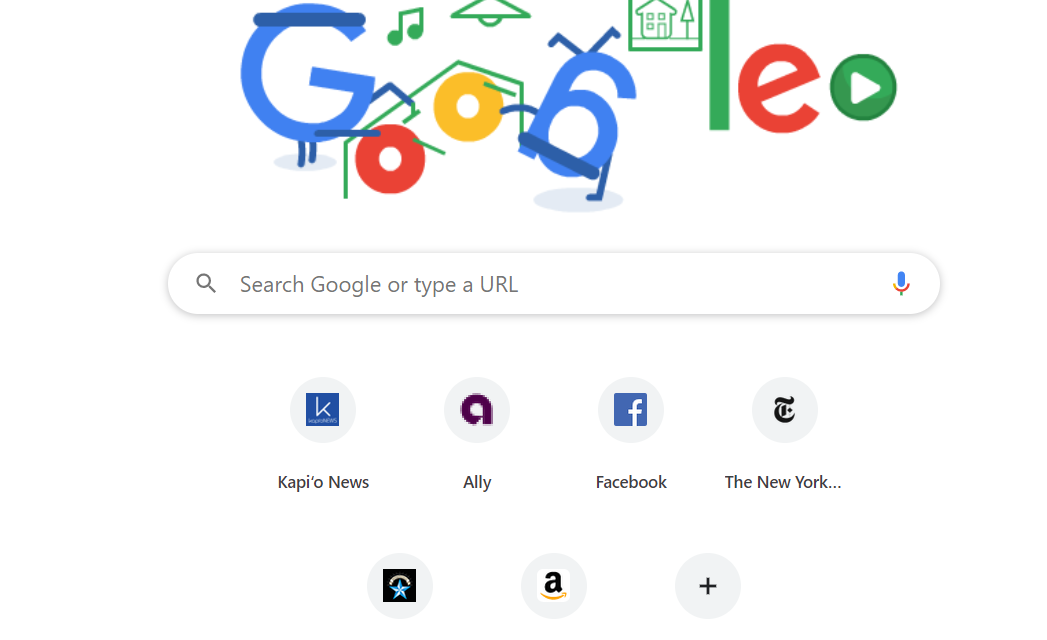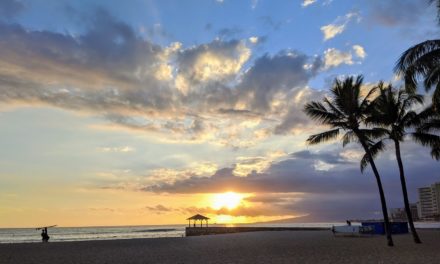[This student submission, created for English 100 Composition class, was selected to appear in Ka Hue Anahā student journal, which publishes academic and research writing in all disciplines and programs except STEM-related courses. For inquiries and information about submissions, contact Board of Student Publications.]
By Tiffany Ly
The first amendment of the United States of America grants citizens the freedom of speech, along with the freedom of religion, press, assembly and petition for a better system. Unfortunately, other countries do not have this right and may experience government censorship for political reasons. People from around the world are coming to a realization that having an opinion is a crucial thing and having a voice makes an impact. However, the strict laws of these countries prevent people from accessing certain social media websites that are available to other countries, thus allowing the government to control specific information that is shown to the public. In order to build a stronger trust within our society, governments should not be allowed to take away our voice by censoring our speech and spreading propaganda.
Some will argue that internet censorship will protect individuals from experiencing hate speech. Online bullying is very prominent in this day and age, with millions of people being able to connect and communicate with others around the world. An article from USA Today states “more than half of Americans – 53 percent – say they were subjected to hateful speech and harassment in 2018 [and] 37 percent reported severe attacks, including sexual harassment and stalking, according to a survey released Wednesday by the Anti-Defamation League, a nonprofit which tracks and fights anti-Semitism” (Gyunn). Many would argue that if the government were to implement a policy to censor certain content and restrict others from obtaining information and using criticism to harm others, then the percentage of online harassment would not be so high. But, because the internet is a public domain that is accessible to millions of people around the world, I believe that if we were to implement this, we would not have such an abundance of information and content that is available at our fingertips. If the government is given the power to regulate what is being posted, I feel that this would hinder our ability to express our creativity and ideas to others who would benefit from them. It would also limit recognition and support from members of that community. Unless the content is in violation of another’s safety or wellbeing, I feel that internet restriction is not necessary. Criticism is inevitable, and people should still be allowed to have their opinions on any topic. However, if a law like this were to pass, many voices of dissent would be silenced.
Politicians will often argue that censorship will protect the public from accessing information that is harmful to their society, when in reality, it is to ensure control over the public. Take North Korea, one of the most powerful communist countries in the world, as an example. In the past, they have taken action to control almost any available source of media that is open to the public: “ Article 67 of the country’s constitution calls for freedom of the press, but nearly all the content of North Korea’s newspapers, periodicals, and broadcasters comes from the official Korean Central News Agency (KCNA), which focuses on the political leadership’s statements and activities” (“10 Most”). In addition, another article from Nishat Choudhury mentions, “ruling parties can quash dissident activity and monitor online communications. Governments are then able to extend a greater hold over what people say and do, and often, how they vote.” This brainwashes the citizens into thinking that their country is the best because of the limited media that is accessible. This isn’t the best thing for society; I feel that having the ability to read other people’s opinions is necessary for a country to succeed. We need to experience the perspectives of others in order to grow, and social media websites and journalists allow us this privilege. Having state-run media prevents original opinions because there is nothing else that can be used as a basis for comparison. The leader does this to create a “cult following,” amplifying his or her ego so that once everyone is unformed, ignorance and prejudice against new ideals will start to emerge. I feel that individuals should be allowed to voice their opinion whether or not others agree with it because this will force an unheard perspective on those who who could change the situation. Without a free mind, people will grow up to be ignorant and quiet about issues that will affect them and their families because they have nothing else to compare it to. This will also teach the government how to be mindful of the decisions and laws that they propose, helping to build a socially balanced society.
In communist countries, internet censorship is predominant and government surveillance is sneakily programmed into social websites to search for political or social opinions that may cause a disruption. Besides North Korea and China, Vietnam has also fallen victim to increasing restrictions on free speech. The Washington Post wrote an article about Internet censorship, stating, “A new Vietnamese law implemented at the beginning of 2019 requires ‘technology companies to disclose user data and take down content viewed as objectionable’ by the state” (Rezaian). Vietnam’s newly implemented law made free speech about the government illegal, and in return they have resorted to “jailing dozens of dissidents” (Fullerton). Speaking up against unfair treatment will teach others how to respect themselves and increase their self-worth. Common people should be able to unite and be able to speak up as a whole, but if the government is monitoring our media and our posts, we won’t be able to see the inequality within the system. If the government is unaware of how a certain law affects the people, we can use social media to speak up against it in the hopes of changing the system. Recently, an unpopular extradition bill was dropped in Hong Kong due to public criticism and protests. The Vietnamese government has inserted tighter controls in order to “‘[intensify] fear about what [people] can say online, and [increase] uncertainty about what issues and statements will trigger arrests and prosecution’” (Fullerton). This will ensure government control in social media, effectively influencing older and younger generations alike. The only way that we could come to a consensus is if both sides are shown and compared to each other to figure out what is the best option; censorship should play no part in this.
The economic cost of internet censorship would be greatly detrimental to many countries. Preventing the flow of information within a country will not only ruin businesses, but also cut off communication within countries as well. An article written by Chiponda Chimbelu explains, “ internet shutdowns can even be more costly in developing countries because they are less likely to have other good communication systems, such as a functioning postal service or a good network of landlines.” This would mean any business that resides in the country would move and progress a lot slower because of the lack of speedy forms of communications between employees and owners. By the time the country is developed, the rest of the world has moved on because of improvements in society and government. Internet shutdowns will lessen a country’s Gross Domestic Product (GDP) because the internet is so prominent in communications. Darrell M. West introduces a bit of insight to countries that have experienced this problem: “ Economic losses include $968 million in India, $465 million in Saudi Arabia, $320 million in Morocco, $209 million in Iraq, $72 million in the Republic of the Congo, $69 million in Pakistan, $48 million in Syria, and $35 million in Turkey, among other places.” This will hurt their economy and further prove that a free and uncensored internet is essential in today’s society. I feel that this will help us keep records and provide support to small businesses who will need a platform to expand their business.
If internet censorship were to be heavily implemented in countries, governments will use this to their advantage to take control of what goes out to the public, molding citizen’s opinions on the events that are currently happening right now. In early June, Hong Kong was protesting against a bill that “would have allowed extraditions to mainland China” (“The Hong Kong Protests Explained”). Although this bill was discarded, the protests are still very prevalent, leading China to censor information about these protests and labeling them as “dangerous” to the public. The Los Angeles Times reports, “China Digital Times, a California-based website that monitors Chinese censorship, reported that Chinese authorities had ordered media to delete any video related to the Hong Kong protests” (Dixon). This eliminates anyone in China from accessing information on what happens in Hong Kong, as a way “to undermine Hong Kong and destroy China’s ‘one country, two systems’ policy” (Dixon). China’s “Great Firewall” prevents the citizens of China from accessing a multitude of social media and news websites, such as The New York Times and Facebook. The only way to get around this is to use a Virtual Private Network (VPN), in order for citizens to access these sites. (Hochstadt ). I feel that it is unfair for citizens to be oblivious to issues that are taking place in their community. Having freedom of the press is our way of communicating the truth to the public without worrying about government announcements that could be false. In turn, the transparency of information that is being distributed will help the citizens feel more secure and safe because of the trust that is put into their country. I think that the public should be allowed to weigh other options to better solve problems. Exposure to others’ situations will give us the ability to sympathize with others and help teach compassion for those who are suffering. If pain and suffering is being shown around the world, with the right platform, we could improve society’s thinking with just a simple click.
Many do not realize the importance of the internet for our society. It is our way of connecting with individuals across the world, opening up new opportunities and ideas that could help improve the social and political climate of a country. If this privilege is taken away from us, as individuals, we will not grow and develop our ideas, and neither will the countries that are currently developing. Limits are okay, but complete government control is dangerous.
Annotated Bibliography
Choudhury, Nishat. “Why Do Some Countries Censor the Internet?” Open Access Government, 5 Feb. 2019, https:// www.openaccessgovernment.org/countries-censor-the-internet/58366/ Accessed 5 Nov. 2019.
This article gives an overview on other countries and their regulations regarding internet access. Some countries mentioned are Saudi Arabia, China, North Korea, and a few more. I used this article to give me a better understanding of internet censorship for two of my points in my support and opposition.
Chimbelu, Chiponda. “The Government or the People. Telecoms Firms Trapped in Internet Shutdowns: DW: 22.07.2019.” DW.com , 22 July 2019, https://www.dw.com/en/the-government-or-the-people-telecoms- firms-trapped-in-internet-shutd owns/a-49634343. Accessed 8 Nov. 2019.
This article talks about internet shutdowns in Africa and how it is impacting businesses in a harmful way. It depicts the economic aspect of it and how the companies and the government are losing money. I used this article to support one one of my claims about how internet censorship could economically hurt us.
Dixon, Robyn. “The ‘Great Firewall’: China Censors Videos, Social Media Posts of Hong Kong Protests.” Los Angeles Times, 18 June 2019,
https://www.latimes.com/world/la-fg-china-hong-kong- censorship-20190618-story.html. Accessed 6 Nov. 2019.
This talks about the “Great Firewall” of China. The author gives a little background info on the Hong Kong protests and what the government is doing to censor information about it from Chinese citizens. I used this article as a support for my claim of less restriction on internet access.
“15 Advantages and Disadvantages of Internet Censorship.” Green Garage, 6 Mar. 2019, https://greengarageblog.org/15-advantages-and- disadvantages-of-internet-censorship. Accessed 8 Nov 2019
This talks about the pros and cons of internet censorship and how it could affect us. It provides a short explanation of each point. This was used in the beginning of my essay to help me find the talking points used by those who oppose my position.
Fullerton, Jamie. “Vietnam Criticised for ‘Totalitarian’ Law Banning Online Criticism of Government.” The Guardian, 2 Jan. 2019,
https://www.theguardian.com/world/2019/jan/02/vietnam-criticised-for- totalitarian-law-banning- online-criticism-of-government . Accessed 7 Nov. 2019.
This gives a short overview on what had happened in Vietnam and their censorship laws. It talks about what the government has done to ensure nothing would be harmful would be posted towards the government. I had used this as a support about government control and state run media.
Guynn, Jessica. “If You’ve Been Harassed Online, You’re Not Alone. More than half of Americans Say They’ve Experienced Hate.” USA Today, 14 Feb. 2019, https://www.usatoday.com/story/news/2019/02/13/study- most-americans-have-been-targeted-hat eful-speech-online/ 2846987002/ . Accessed 5 Nov. 2019.
This article offers statistics on internet bullying and shows how prominent it is in this day and age. The article covers a large number of statistics on sexual harassment and racial bullying. I used this as evidence for my opposition point. This also gives a little insight into what the government should do to ensure that these problems won’t happen again.
Hochstadt, Ariel. “The Complete List of Blocked Websites in China & How to Access Them.” VpnMentor , 9 Dec. 2018,
https://www.vpnmentor.com/blog/the-complete-list-of-blocked- websites-in-china-how-to-access -them/. Accessed 6 Nov. 2019.
This provides a list of websites that are blocked in China as of right now. It lists common social media and search engines that are very common in other countries. This was useful as part of my evidence when talking about blocked websites and how people could use this as a loophole to access them.
“Hong Kong’s Protests Explained.” Amnesty International, https:// www.amnesty.org/en/latest/news/2019/09/hong-kong-protests- explained/ . Accessed 6 Nov. 2019
This article gives an explanation of the protests in Hong Kong. This goes into detail about how the police are handling it and what the Chinese government and Hong Kong’s government is doing to inform others about it. It gives a description of the victims of this police brutality in the protest. This helped me to get info and a better understanding of what is happening.
Rezaian, Jason. “Opinion | Dictators and the Internet: A Love Story.” The Washington Post, 10 Sept. 2019,
https://www.washingtonpost.com/opinions/2019/09/10/dictators- internet-love-story/ . Accessed 7 Nov 2019.
This article talks about censorship in countries and how governments are using it against us. It uses multiple countries as an example of how government is hiding information from us. I used this as a support for my claim of government surveillance and why it’s important to have a voice.
“10 Most Censored Countries.” Committee to Protect Journalists,
https://cpj.org/reports/2019/09/10-most-censored-eritrea- north-korea-turkmenistan-journa list.php . Accessed 5 Nov. 2019.
This covers 10 most censored countries in the world, providing examples of what has been censored in newspapers and websites. The article discusses what each country is doing to censor what is going on in their society. I used this in the beginning of forming my essay to give me an idea of what topics to choose for my evidence.
“The Hong Kong Protests Explained in 100 and 500 Words.” BBC, 14 Oct. 2019, https://www.bbc.com/news/world-asia-china-49317695 . Accessed 6 Nov. 2019
The article gives a quick overview about the protests that are currently happening in Hong Kong. It explains the reason was behind it and the demands of the protesters. I read this to use it as a background for my essay in one of my support paragraphs to give the reader a little information on what is happening currently at this time.
West, Darrell M. “Internet Shutdowns Cost Countries $2.4 Billion Last Year.” Brookings, 15 Dec. 2016,
https://www.brookings.edu/research/internet-shutdowns-cost- countries-2-4-billion-last-year/ . Accessed 8 Nov. 2019.
This source talks about the economical impact of internet shutdowns and how censorship would harm our companies and businesses. This also talks about the profit that is lost in other countries. I used this in the same paragraph that discusses how censorship could affect us economically.






